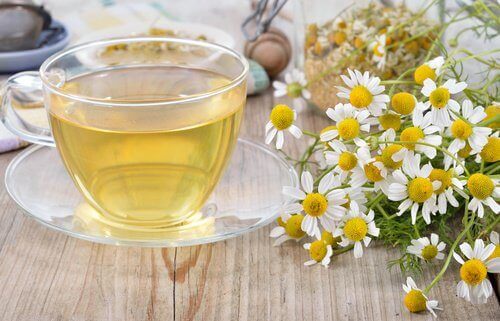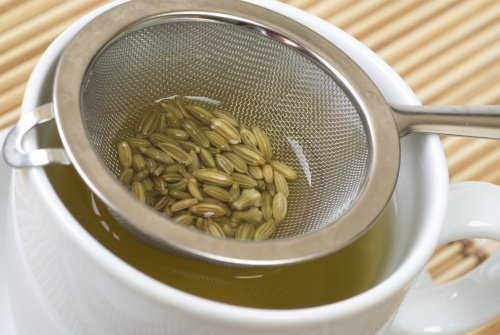Teas that Fight Digestive Problems


Reviewed and approved by the doctor Nelton Abdon Ramos Rojas
Are you suffering from stomach pain and discomfort? Do you want to fight digestive problems?
Indigestion is the inability to correctly process the foods you have eaten. As a result, the digestion process is slowed down. This shouldn’t be confused with bloating, which is sporadic and doesn’t last for a long time.
In this article, we’ll give you a guide to the teas that best fight digestive problems such as indigestion. If you suffer from this problem, try the benefits of these natural teas!
You might like: How to Treat Stomach Indigestion with 5 Homemade Remedies
Why Do We Have Indigestion?

There are many reasons we might have indigestion. Some of the most common causes are:
Digestive tract diseases
The presence of ulcers in your stomach can lead to indigestion or other digestive problems. However, the culprit could also be gallstones, gastritis, pancreatic cancer, stomach cancer, acid reflux disease, or a combination of these.
Acid reflux disease causes damage to the stomach and esophageal lining. This makes you more vulnerable to pain after eating.
Eating habits
You’ve probably heard the saying “you are what you eat.” We could probably change that to “you get sick based on what you eat.” This is definitely true.
Certain foods increase the possibility of suffering from indigestion. These foods come from an imbalanced diet with too much fat or heavy foods.
At the same time, there are several sources of indigestion. It can come from eating too quickly, snacking between meals, eating too many vegetables, drinking coffee, and chewing gum.
You might like: How Much Coffee Should You Have Daily?
Another possible cause that deserves mentioning is an intolerance to certain foods. One of the most well-known problems in this group is lactose intolerance. Another problem is eating incompatible foods at the same time. Having hot soup while drinking cold water isn’t good for your stomach.
Medications and toxic substances

Another reason we might suffer from digestive problems is medication. Some strong drugs like antibiotics, antidepressants, anti-inflammatory drugs, and corticosteroids can cause digestive issues. Tobacco use can also cause problems and as it is toxic, we should avoid it at all costs.
Psychological problems
Stress, nervousness, anxiety, or personal problems can all impact your digestive system. As a result, when we are angry or sad about something, we don’t feel as good.
Teas that Help Fight Digestive Problems
One of the remedies our grandmothers used when our stomachs hurt or we had indigestion was to “drink a cup of tea.”
Believe it or not, Grandma was on to something. Some teas can help fight digestive problems like indigestion and its symptoms. Here are some of the best:
Green tea
There are many benefits of drinking this tea, the majority of which are related to the digestive tract.
To start, you should know that green tea is a great substitute for coffee. You can drink it cold or hot depending on the time of year or which you prefer.
Green tea has many antioxidants that encourage the work of gastric juices and ease digestion. If this weren’t enough, it also has the ability to reduce gas and inflammation.
You can drink a cup of green tea in the morning, another in the afternoon, and a third before sleeping. You can find it in tea bags or loose leaf.
Chamomile with anise

Chamomile is considered to be an antispasmodic and anti-inflammatory herb. It also helps calm your stomach, reduce the feeling of heaviness, and get rid of gasses.
Since chamomile is a calming plant, it works well when indigestion is caused by nervousness or anxiety. It’s also delicious!
Drink two cups a day and you’ll see results.
Dill
Dill comes from the Mediterranean sea and is often used in cooking. Due to its therapeutic benefits, many people add dill to herbal tea.
Fennel

Fennel is also used in cooking, and it can help us to fight digestive problems. It reduces swelling, treats cramps, and fights other gastrointestinal issues. At the same time, it helps us feel fuller.
This digestive plant has a smooth flavor and is usually combined with cumin and anise.
Drink fennel tea as soon as you start to feel symptoms of indigestion.
Yarrow
If you suffer from very strong stomach or intestinal pain, try some yarrow tea. Yarrow has a high concentration of flavonoids. These help increase digestion and keep you regular.
You can also use yarrow to treat nausea and stomach acid problems. It has diuretic properties and stimulates your liver.
You can find yarrow in health foods stores. Make a tea with the plant and drink it daily. This way, you can enjoy all of its benefits.
Thyme
This herb has been used for centuries to help with digestion thanks to its excellent properties. It’s great at relieving diarrhea, cramps, gas, and vomiting.
It’s recommended to drink this tea at night. Drink a cup before bed to kiss the heavy feeling in your stomach goodbye. Additionally, thyme helps fight nightmares and insomnia.
Other plants that can help you alleviate indigestion are dong quai, anise, lemon balm, rooibos, and marjoram.
Many of the teas and herbs mentioned here can be found easily at your local market or grocery store. Add them to your diet to help fight digestive problems and enjoy a nice warm cup of tea while you relax.
All cited sources were thoroughly reviewed by our team to ensure their quality, reliability, currency, and validity. The bibliography of this article was considered reliable and of academic or scientific accuracy.
- Nasehi, M., Sehhatie, F., Zamanzadeh, V., Delazar, A., Javadzadeh, Y., & Chongheralu, B. M. (2013). Comparison of the effectiveness of combination of fennel extract/vitamin E with ibuprofen on the pain intensity in students with primary dysmenorrhea. Iranian journal of nursing and midwifery research, 18(5), 355-9.
https://www.ncbi.nlm.nih.gov/pmc/articles/PMC3877456/ - Oral fennel (Foeniculum vulgare) drop effect on primary dysmenorrhea: Effectiveness of herbal drug (2013). Bokaie M1, Farajkhoda T, Enjezab B, Khoshbin A, Karimi-Zarchi M.
https://www.ncbi.nlm.nih.gov/pubmed/23983742 - Srivastava, J. K., Shankar, E., & Gupta, S. (2010). Chamomile: A herbal medicine of the past with bright future. Molecular medicine reports, 3(6), 895-901.
https://www.ncbi.nlm.nih.gov/pmc/articles/PMC2995283/ - Babaeian, M., Naseri, M., Kamalinejad, M., Ghaffari, F., Emadi, F., Feizi, A., Hosseini Yekta, N., … Adibi, P. (2015). Herbal Remedies for Functional Dyspepsia and Traditional Iranian Medicine Perspective. Iranian Red Crescent medical journal, 17(11), e20741. doi:10.5812/ircmj.20741
https://www.ncbi.nlm.nih.gov/pmc/articles/PMC4698144/ - Thymol, thyme, and other plant sources: Health and potential uses (2018). Salehi B, Mishra AP, Shukla I, Sharifi-Rad M, Contreras MDM, Segura-Carretero A, Fathi H, Nasrabadi NN, Kobarfard F, Sharifi-Rad J.
https://www.ncbi.nlm.nih.gov/pubmed/29785774
This text is provided for informational purposes only and does not replace consultation with a professional. If in doubt, consult your specialist.








